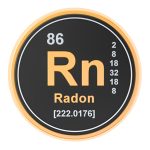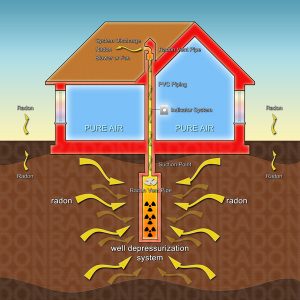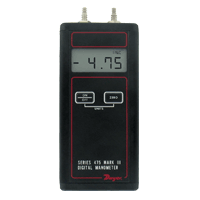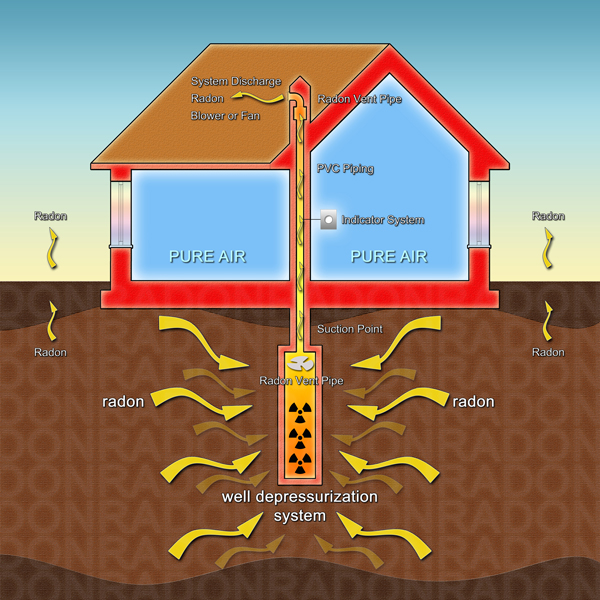 Radon is a naturally occurring radioactive gas that comes from the decay of Uranium. It is often found in the rock and soil upon which many residential and commercial buildings are built.
Radon is a naturally occurring radioactive gas that comes from the decay of Uranium. It is often found in the rock and soil upon which many residential and commercial buildings are built.
As it is a well known carcinogen, long term exposure to radon can drastically increase the chances of developing lung cancer. Therefore, many residential and commercial buildings contain radon mitigation systems to ventilate the radon from the ground below out of the enclosed space.
 A typical mitigation system consists of a radon collection area, along with a radon mitigation fan to create a slight negative pressure in the ductwork. This moves the radon out of the soil, up and out of the building into the ambient air. This process prevents radon from slowly filling the enclosed rooms of a building as it is released from the soil below.
A typical mitigation system consists of a radon collection area, along with a radon mitigation fan to create a slight negative pressure in the ductwork. This moves the radon out of the soil, up and out of the building into the ambient air. This process prevents radon from slowly filling the enclosed rooms of a building as it is released from the soil below.
Radon fan sizing is critical to proper mitigation, but is largely done through guesswork and experience. For a radon mitigation system to perform properly, the fan must be powerful enough to ensure that all of the gas that is collected can be ventilated out the top of the building. Having a fan that is undersized can lead to unanticipated radon build-up in the building.
On the other hand, a fan that is vastly oversized will drive up costs for building owners. Radon mitigation systems need to be run 24/7, and an oversized fan pulling too much power can drive up utility costs.

Taking care to properly size radon fans can ensure that radon mitigation systems can run effectively and efficiently. The Intrinsically Safe Handheld Digital Manometer, Series 475, can be used in conjunction with a portable radon fan in order to determine the pressure drop that will be experienced along the run of PVC pipe that is in the system, as well as the fan pressure drop. This will allow the installer to select a fan that will provide enough ventilation to overcome the pressure drop in the system, without selecting an oversized fan that will drive up operating costs for the building owner.
The 475 is a compact, FM approved manometer that can be easily fit into a fan carrying case with a portable fan. This allows it to be accessible to the installer at any job site. The device can be zeroed out using a simple push button to ensure that readings are accurate and do not suffer from any zero drift. The unit is designed to measure pressures from 0-10″ in w.c., so the product will offer 2 decimal point resolution in pressure readings, even at very low pressures.
Other Dwyer products used in radon mitigation applications include:
- Air Flow Indicator and Alarm, Series DAFA
- Flex-Tube® U-Tube Manometer, Series 1221
- Magnehelic® Differential Pressure Gage, Series 2000

